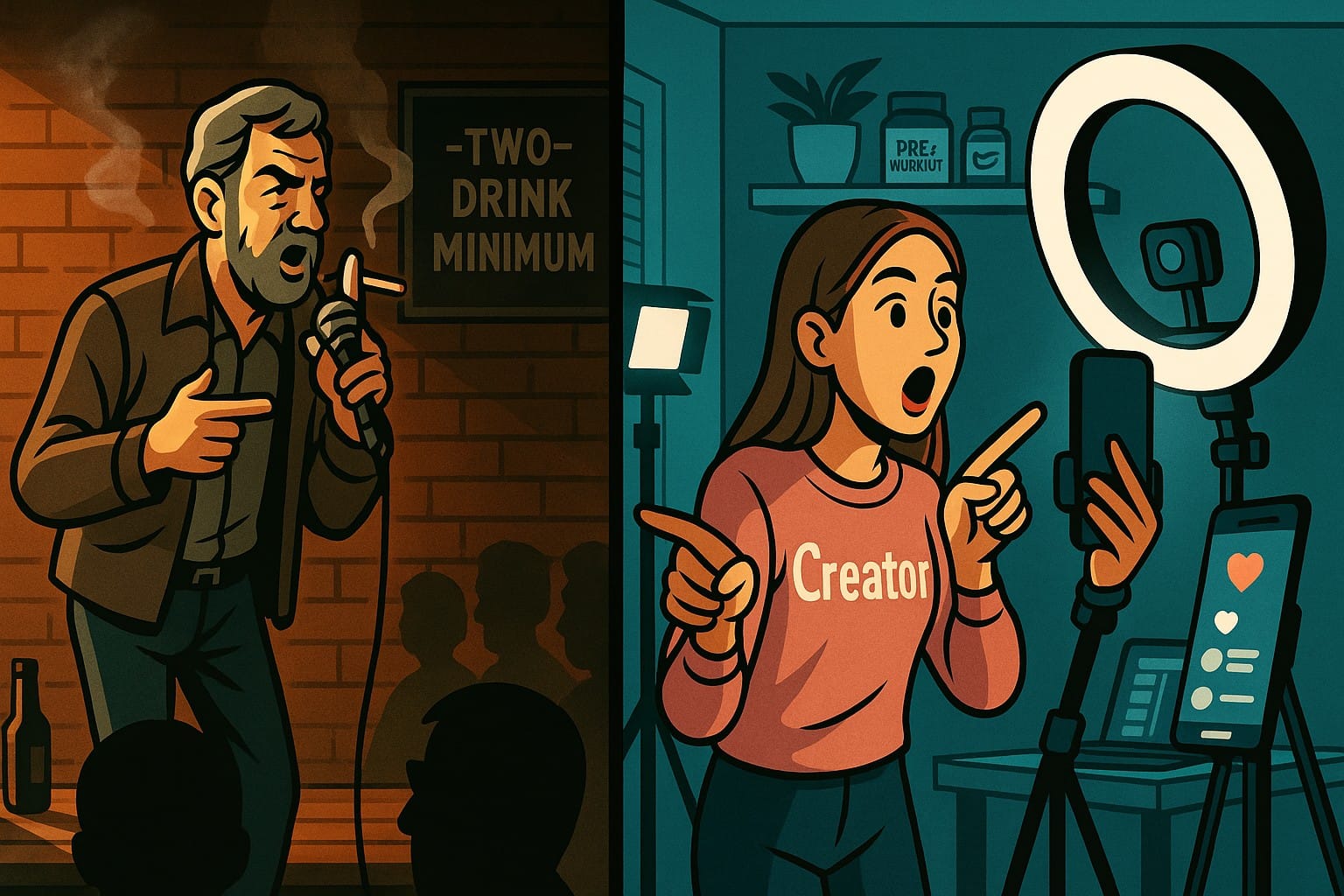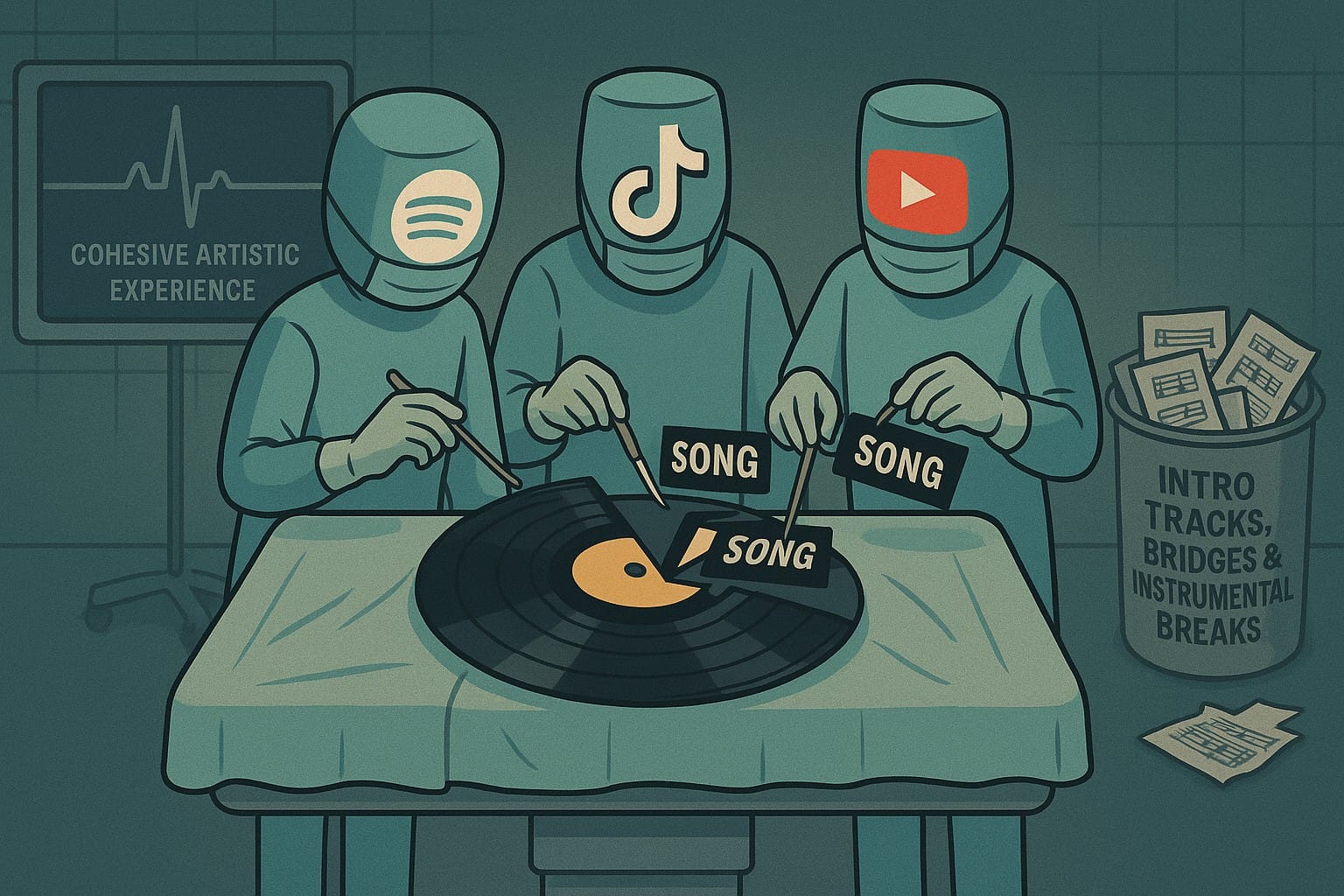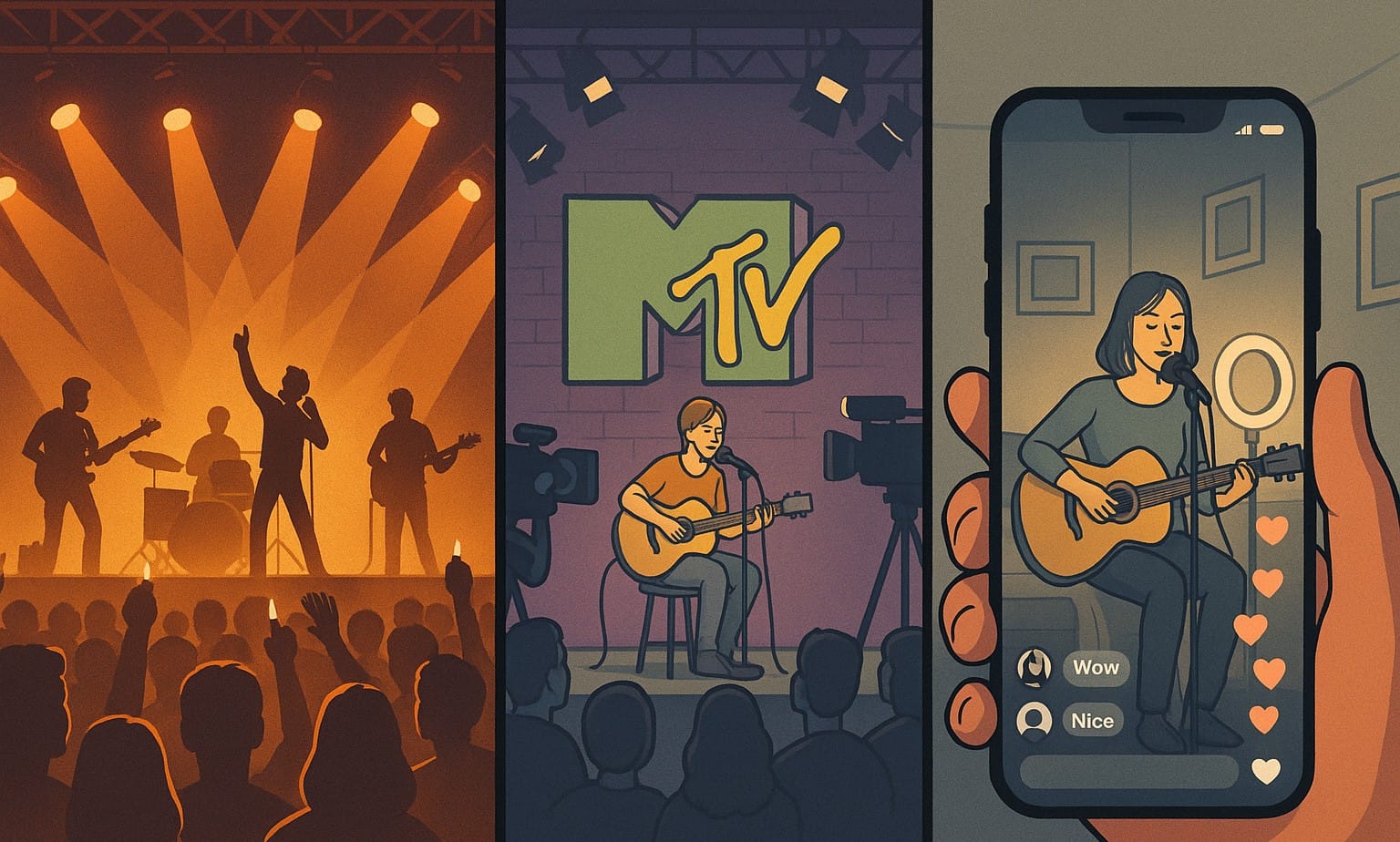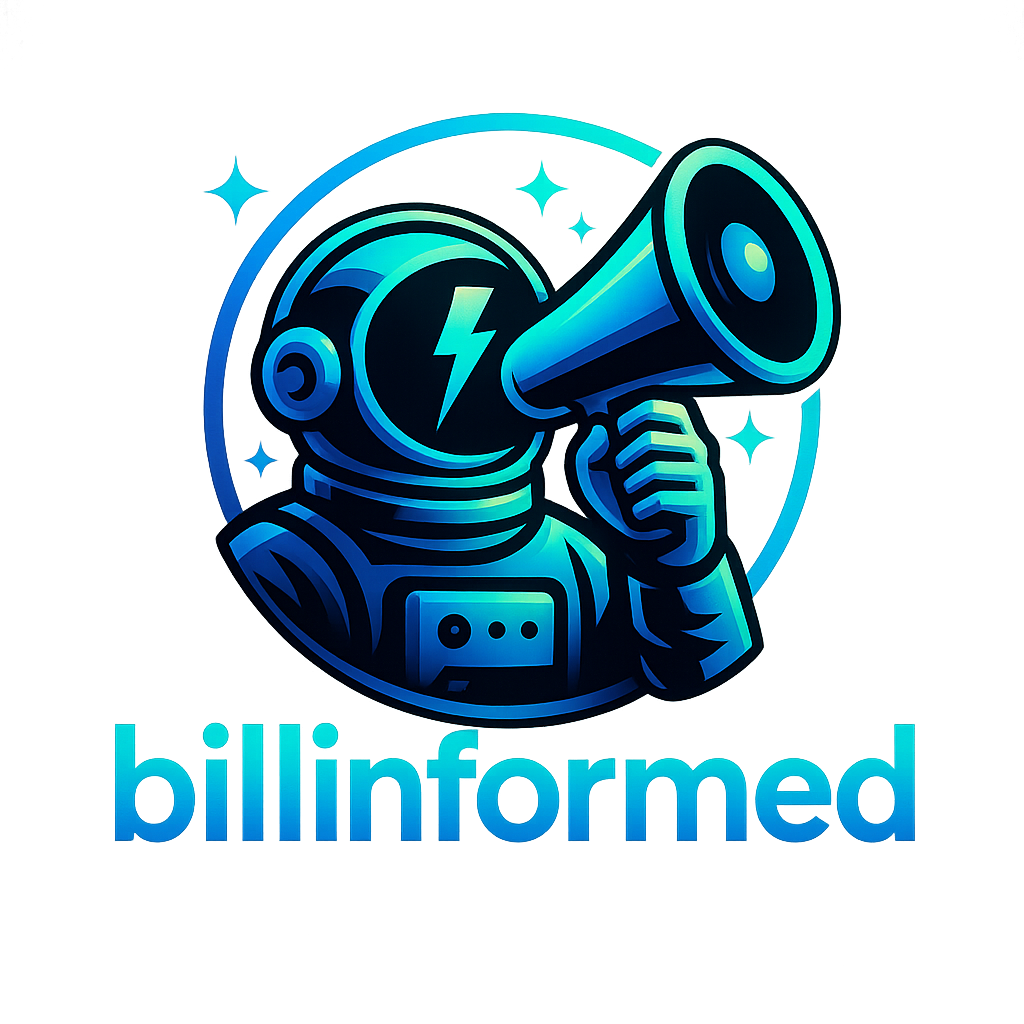How Algorithms Ate Entertainment (And Why That TikTok Comedian Is Probably Not That Funny)

That TikTok comedian just announced a sold-out theatre tour.
He's built his entire career on fifteen-second videos about how different generations pronounce "GIF."
Welcome to 2025, where the same technology that was supposed to democratize creativity has instead turned entertainment into an optimization game with occasional laughs.
When Michael Jackson Had to Fight Zombies (And Other Origin Stories)
Remember 1983? Michael Jackson's "Thriller" video drops, and suddenly, musicians can't just make music anymore. Now they need to choreograph elaborate dance sequences while fighting the undead. The bar has officially moved from "write a good song" to "write a good song AND direct a mini-horror movie."
The man was already the King of Pop, but that wasn't enough for the MTV era. Now he needed to be a choreographer, actor, special effects coordinator, and storytelling genius - all in four minutes of television time.
Meanwhile, in smoky comedy clubs across America, future stars are eating shit sandwiches for breakfast, lunch, and dinner. Bombing night after night until they figure out how to make drunk strangers laugh without getting bottles thrown at them. The apprenticeship was brutal: develop timing through repetition, learn crowd work by dealing with actual crowds, and build material that could hold attention for a full hour.
Both scenarios had something in common: gatekeepers who gave a damn about their reputations. MTV executives knew that if they kept airing garbage, they'd eventually get fired. Club bookers understood that consistently booking terrible acts would kill their venues. Record labels invested in artists they thought had staying power, not just viral potential.
Fast forward to today. That struggling comedian's spiritual successor just went viral with a TikTok about generational coffee-ordering habits. He's now selling out theatres based on thirty seconds of observational humour about oat milk.
The algorithm doesn't care if he bombs spectacularly in front of a live audience. It got its engagement. Mission accomplished.
MTV: When Television Devoured Music (And Loved the Taste)
MTV deserves credit as the first platform to completely reshape an art form through distribution mechanics. When it launched, it didn't just change who could become famous - it fundamentally altered what music needed to be.
Consider Michael Jackson's evolution from artist to multimedia phenomenon. "Off the Wall" was a more sophisticated album musically - better songwriting, more cohesive as an artistic statement, a masterclass in R&B sophistication. But "Thriller" was designed for television.
The medium created entirely new requirements. You needed songs that worked as visual stories. Verses and choruses had to accommodate narrative beats. The format demanded singular focal points - solo artists who could command camera attention in ways that were nearly impossible for bands to achieve. How do you split screen time between four people and still tell a compelling story?
We shifted from music optimized for repeated listening to music optimized for memorable viewing. The album as an artistic statement began dying the moment music videos became marketing necessities.
But MTV's influence went deeper than just adding visuals. It accelerated the pace of musical trends, created new hierarchies based on video budgets rather than just musical talent, and established the template for how distribution platforms reshape content.
The irony writes itself: MTV, the network that revolutionized music by making it visual, eventually stopped playing music entirely. Turns out reality TV was more profitable than music videos. "The Real World" got better ratings than the newest Nirvana video.
When your distribution mechanism becomes more valuable than the content it distributes, guess which one survives?
This pattern would repeat with every subsequent platform. The medium doesn't just influence the message - it devours it, digests it, and spits out something optimized for its own survival.
From Stand-Up to Scroll-Up: How Comedy Became Costco Samples
Let's talk about what we've lost in comedy, because it's the perfect microcosm of everything wrong with algorithmic curation.
Traditional stand-up was brutal but educational. You learned timing through repetition - not just the timing of individual jokes, but the rhythm of an entire set, how to build tension and release it. How to recover from a joke that didn't land. How to read a room and adjust your material accordingly.
You developed crowd work by dealing with actual crowds - drunk ones, hostile ones, distracted ones. You figured out how to handle hecklers without losing the rest of the audience. You learned the difference between a joke that works at 9 PM and one that works at 11:30 PM when everyone's had three more drinks.
Most importantly, you had to hold people's attention for actual time periods. Not fifteen seconds, not thirty seconds, but twenty minutes, forty-five minutes, a full hour. You had to create an arc, develop themes, build callbacks, and make the whole thing feel like a complete experience rather than a series of disconnected punchlines.
Now? The most successful "comedians" are optimization specialists. They've mastered hashtag strategy, visual composition, and the ancient art of delivering a punchline before someone swipes to watch a cat video.
Take crowd work - traditionally one of the most challenging skills in comedy. It requires quick thinking, the ability to incorporate unexpected elements, and the confidence to go off-script while maintaining momentum. On TikTok, "crowd work" means responding to comments in your next video. It's crowd work for people who've never been in a room with a crowd.
These are valuable skills if you want to work at a digital marketing agency. They're less valuable if you want to be funny for ninety consecutive minutes in front of people who paid actual money to not look at their phones.
The result? Comedy has become the equivalent of those free samples at Costco. Just enough to grab your attention, perfectly portioned for immediate consumption, but never enough to satisfy. And just like those samples, they're designed to make you buy something bigger - a ticket to a show where the comedian discovers that viral moments don't translate to sustained entertainment.
It's like training sprinters for marathons. Sure, they're both running, but the skill sets are entirely different. Worse, the sprinter doesn't know they're about to run a marathon until they're already on stage.

The Album vs. The Single (The Death of Cohesive Experiences)
The shift from albums to singles predates streaming, but algorithms have accelerated it into something almost unrecognizable. Musicians used to think in terms of cohesive experiences - how songs related to each other, how the album flowed, what story the complete work told.
Now they think in terms of which thirty-second snippet will hook someone scrolling through Spotify. The "skip rate" in the first few seconds determines everything. Intros have disappeared. Songs start with the hook. Bridges and instrumental breaks are endangered species.
The irony is that we have access to more music than ever before, but we experience less of it. We consume songs the way we consume news - in fragments, out of context, optimized for immediate impact rather than lasting impression.
Artists adapt accordingly. Why spend months crafting an album when you can release singles continuously, each one optimized for playlist inclusion? Why develop a distinctive sound when the algorithm rewards whatever's currently trending?
The result is a musical landscape that feels simultaneously infinite and homogeneous. Endless variety, but somehow everything sounds like an optimized version of everything else.

We Traded Quality Control for Quantity Chaos
Every technological shift involves trade-offs. We gained democratization - anyone can theoretically reach an audience without institutional permission. We gained diversity - voices that traditional gatekeepers would never have considered now have platforms. We gained immediacy - artists can release work directly to audiences without waiting for label approval or venue booking.
But we also lost something crucial: environments where mastery develops slowly and quality gets evaluated over time.
The old system was biased, exclusionary, and often arbitrary. But those biases often included "Will this still be relevant next month?" and "Can this person actually deliver what they're promising?" The algorithm's only concern is "Will this generate engagement right now?"
It's optimizing for the wrong metric entirely. Like judging restaurants solely on how quickly they can get food to your table, regardless of whether it tastes good or gives you food poisoning.
We've created a system that rewards people for being good at the system rather than good at their craft. The skills required for algorithmic success (understanding trends, posting frequency, audience engagement tactics) are almost entirely separate from the necessary skills for artistic excellence.
Survival Guide for the Scroll-Optimized Entertainment Apocalypse
So are we doomed to a future of TikTok comedians who die on stage and musicians who can't write a complete song?
Probably. But there are still pockets of resistance.
The artists who've been grinding for years instead of months still exist - they're just harder to find under the avalanche of optimized content. Albums that reveal themselves over multiple listens are still being made, though they're competing for attention with songs designed to hook you in the first three seconds.
Live shows remain the great equalizer. You can't fake genuine stage presence or musical ability in real time. A comedian who's built their career on viral videos will reveal themselves pretty quickly when they have to hold a room's attention for an actual hour. Same with musicians who've optimized for playlist inclusion - the difference becomes obvious when they have to perform without the safety net of studio production.
The irony is that the best entertainment has always required the thing algorithms can't measure: time. Time to develop, time to appreciate, time to understand the deeper layers that don't reveal themselves in a fifteen-second preview.
But time is precisely what the new system discourages. Both for creators, who are incentivized to produce constantly, and for consumers, who are trained to swipe away the moment something doesn't immediately grab them.
The gatekeepers are gone, which means the responsibility has shifted to consumers. Unfortunately, most people would rather scroll than think, which is how we ended up here in the first place.
Your Fifteen-Second Fame Is Ready
In the end, this isn't really about algorithms or platforms or technological disruption. It's about incentives and attention spans.
When you reward people for capturing attention instead of deserving it, you get a lot of captured attention and very little earned respect. When you optimize for immediate gratification instead of lasting satisfaction, you end up with a cultural landscape that feels like surviving on energy drinks - lots of quick highs followed by inevitable crashes.
The good news? Quality still matters. It's just harder to find now, buried under an avalanche of optimized content designed to hijack your dopamine receptors.
The bad news? Your favourite viral comedian is definitely going to bomb when they try to stretch fifteen seconds of material into sixty minutes.
At least the crash will be entertaining to watch.
I don't sell memberships or anything, but if you want to buy me a beer, I won't refuse.


